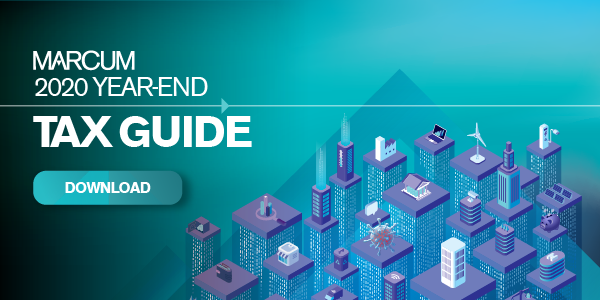Tax 101: Tax Law Changes for College Students
By Gina Linss, CPA, MST, Manager, Tax & Business Services
There are some passing and some failing grades in The Consolidated Appropriations Act, 2021 (CAA, 2021) as it pertains to our nation’s higher education students. The CAA, 2021, signed on December 27, 2020, contains both the COVID-Related Tax Relief Act of 2020 (COVIDTRA) and the Taxpayer Certainty and Disaster Tax Relief Act of 2020 (TCDTR).
Under COVIDTRA, Emergency Financial Aid grants paid to students after March 26, 2020, as provided by the Coronavirus Aid, Relief and Economic Security (CARES) Act, are considered grants that, therefore, do not need to be repaid. These grants were paid directly to students who were facing urgent needs due to the COVID-19 pandemic. Additionally, the new tax act declares for these grants to be excluded from the student’s calculation of gross income for federal income tax purposes. Historically, the tax code disallows expenses paid for by nontaxable income, such as scholarships and educational assistance allowances, to be used towards the calculation of higher education expenses paid for purposes of claiming educational credits. Since the Emergency Financial Aid grant money has been deemed to be tax-exempt income, it also cannot be used towards the claims of either the American Opportunity and/or the Lifetime Learning credits. This grant money will not be included on the students Form 1098-T, provided by higher-education institutions, as instructed by the IRS, to avoid confusion.
COVIDTRA has repealed the deduction for Qualified Tuition and Related Expenses, which was originally set to expire on December 31, 2020. Originally anticipated to be extended, the tax law has transitioned from this deduction to increased income limitations on the Lifetime Learning Credit (LLC). The modified adjusted gross income limitation for qualifying for the LLC is now the same as that of the American Opportunity Tax Credit (AOTC). Both tax credits are subject to a phaseout of modified adjusted gross income of $80,000 ($160,000 for married filing jointly). Individual taxpayers may claim the AOTC and/or the LLC for higher-education expenses at an accredited postsecondary educational institution paid for themselves, their spouses, and their dependents.
Historically, the tax law permitted employers to provide educational assistance, up to an annual maximum of $5,250, to be excluded from employee’s income. The CARES Act had added to this law by including eligible student loan repayments made between March 27, 2020 and January 1, 2021, to the definition, for tax purposes, of educational assistance. CAA, 2021 further extends the exclusion for loan repayments through the end of 2025.
Student loan repayments have been suspended through September 30, 2021. Loan repayments have been suspended as part of COVID-19 emergency relief, because of the CARES Act. On March 20, 2020, the Secretary of Education had suspended loan payments, stopped collections on defaulted loans and set interest rates to 0% for a 60-day period. Throughout 2020, President Trump had directed the Secretary of Education to continue to suspend loan payments, stop the collections and waive interest on such student loans until January 31, 2021. As of January 20, 2021, President Biden has extended the January 31st repayment date to September 30, 2021.
Although these changes were last-minute, they could have a significant financial impact on our nation’s students and will have an impact on their, or their parents’, federal income tax returns for 2020 as well as their bank accounts. A timely reminder—the changes discussed above are only the most recent tax law changes pertaining to higher education expenses. The Consolidated Appropriations Act, 2021 includes many other tax law changes to both individual and business taxable income.
This article originally appeared in the February 2021 TaxStringer and is reprinted with permission from the New York State Society of Certified Public Accountants.
Coronavirus Resource Center
Have more questions about the impact of the coronavirus on your business? Visit Marcum’s Coronavirus Resource Center for up-to-date information.




















